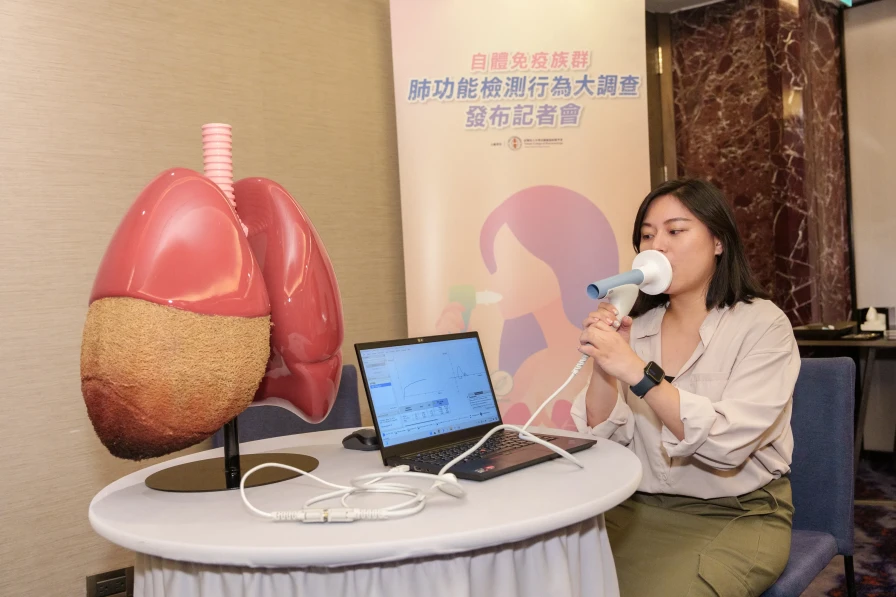Don't ignore acute exacerbation when it's cold, you're coughing and you're tired, the mortality rate exceeds 50%! Anti-pulmonary fibrosis drugs receive expanded benefits

Beware of chronic progressive pulmonary fibrosis when coughing and wheezing in cold weather
When the weather gets colder, if you experience unusual coughing, wheezing, tiredness, or active difficulty breathing, be careful to see if it is a potential sign of “interstitial lung disease”! Professor Wang Hejian, deputy director of the Taiwan Society of Thoracic and Intensive Care Medicine and National Taiwan University Cancer Center, pointed out that scabbing after injury to body tissue is a kind of local “fibrosis”, and continued injury to the lungs is “pulmonary fibrosis”. Among them, progressive pulmonary fibrosis not only causes dry cough, shortness of breath, and respiratory failure, but the most serious form, “idiopathic pulmonary fibrosis” (commonly known as Caiguabu lung), has even worse disease course and survival rate than cancer.
Professor Wang Hejian said that chronic progressive pulmonary fibrosis is an interstitial lung disease. Due to damage to the lung interstitium and gradual fibrosis of the lungs, patients are usually very sensitive to climate changes. Temperature, humidity and environmental pollution sources may all pass through the respiratory tract and lungs. Exacerbation of symptoms due to external contact. In addition, infections such as influenza, COVID-19, and RSV (Respiratory Syndrome Virus), which are rampant in winter, can also cause airway constriction or interstitial injury in the lungs, increasing the risk of acute exacerbation of pulmonary fibrosis.
Lung function plummets and the risk of death from acute deterioration is nearly 50%
Professor Zheng Shilong, director of the Department of Thoracic Medicine at Far Eastern Memorial Hospital, pointed out that the main cause of interstitial lung disease is not yet clear. Clinically, pulmonary function tests and high-resolution computed tomography (HRCT) image interpretation are used as diagnostic criteria. Patients with interstitial lung disease will suffer from damage and thickening of the interstitium of the lungs, resulting in obstruction of gas exchange and eventually being unable to breathe normally. Once acute deterioration causes a “cliff-like” decline in lung function, patients may even need to wear an oxygen mask to live, seriously affecting their health. quality of life.
Professor Zheng Shilong said that not only the well-known “idiopathic pulmonary fibrosis” can cause severe pulmonary fibrosis, but other causes such as hypersensitivity pneumonitis, autoimmune diseases and various interstitial diseases may also cause pulmonary fibrosis, among which Up to 30% of patients will develop progressive pulmonary fibrosis that continues to progress. In the past, only symptomatic treatment drugs were available for pulmonary fibrosis. If lung function is not stably controlled, the risk of death from an acute exacerbation is close to 50%.
In recent years, “anti-pulmonary fibrosis” drugs have been introduced, which can prevent the continued progression of pulmonary fibrosis and have a significant effect in delaying the worsening of the disease. Clinical studies show that anti-pulmonary fibrosis drugs can reduce the decline in lung function by 57%, and analysis results in Asian groups can reduce the risk of acute exacerbation and death by 74%. This year (2023), they will receive expanded health insurance benefits and are expected to benefit more than 1,300 people. Patients with chronic progressive pulmonary fibrosis. Professor Zheng Shilong reminded that the payment conditions for anti-pulmonary fibrosis drugs are related to lung function. Patients should seek medical treatment early and regularly test lung function to reduce the risk of worsening pulmonary fibrosis.
Autoimmune disease complicated by pulmonary fibrosis may cause mortality rate to exceed 40% within one year
Autoimmune diseases include rheumatoid arthritis, scleroderma, Sjogren’s disease, polymyositis, dermatomyositis, and lupus erythematosus, all of which are high-risk groups for pulmonary fibrosis, Dr. Cai Yunzhen, Department of Rheumatology and Allergy, Linkou Chang Gung Memorial Hospital It is pointed out that there are nearly 120,000 patients with autoimmune diseases in Taiwan, and there are many “candidates” who do not meet the diagnostic criteria but already have autoimmune antibodies. Among them, scleroderma (systemic sclerosis), dermatomyositis/polymyositis, and mixed connective tissue disease have a particularly high risk of pulmonary fibrosis. For example, the incidence rate of pulmonary fibrosis in mixed connective tissue disease is as high as nearly five years. become.
Dr. Cai Yunzhen said that most patients with autoimmune diseases need to use immunosuppressants. Long-term suppression of the immune system increases the risk of various infections. Research shows that the mortality rate within one year after autoimmune disease is complicated by pulmonary fibrosis is as high as 40%. When pulmonary fibrosis occurs and severe infection occurs at the same time, the condition may become out of control. In the past, health insurance coverage for anti-pulmonary fibrosis drugs was limited to specific autoimmune diseases. Now expanded coverage will help more patients with autoimmune diseases reduce the risk of lung function deterioration and achieve better prognosis and survival.
Dr. Cai Yunzhen reminded that patients with autoimmune diseases should return for regular check-ups and undergo pulmonary function tests every six months to pay early attention to the presence of pulmonary fibrosis or track the progression of pulmonary fibrosis. In addition, it has been clinically found that dysphagia and gastroesophageal reflux are also related to inflammation related to pulmonary fibrosis. Patients with autoimmune diseases should pay more attention to whether there are related symptoms and explain to the attending physician in a timely manner.
Expanded coverage of anti-pulmonary fibrosis drugs for 3 major symptoms plus regular testing to protect lungs early
Pulmonary fibrosis varies from person to person and the course of the disease is variable. If not detected early and treated appropriately, the 5-year survival rate is even lower than that of some cancers. Professor Zheng Tiancai, chairman of the Rheumatology Society of Taiwan, said that chronic progressive fibrosis has always been a major threat to patients with autoimmune diseases. In the past, anti-pulmonary fibrosis drugs had to be used at one’s own expense, and the monthly drug cost could be as high as 60,000 to 70,000 yuan. . The current expansion of health insurance benefits will help more patients facing the threat of pulmonary fibrosis to receive better treatment in a timely manner.
In order to improve Taiwanese people’s understanding of chronic progressive pulmonary fibrosis, the medical community jointly promotes the “360-round concept of lung protection”, pay attention to the “3” major symptoms of cough, wheezing, and fatigue, and perform routine lung function once every “6” months Examination, through multi-specialty diagnosis and treatment in the Department of Chest Medicine, Allergy, Rheumatology and Immunology and Radiology, “0” distance. In particular, high-risk groups should undergo pulmonary function testing every 3-6 months, and high-resolution computed tomography scans should be arranged when abnormal lung images are found. Patients are reminded to return for regular check-ups, pay attention to nutritional intake, cooperate with appropriate exercise and lung rehabilitation exercises, and receive COVID-19, influenza and Streptococcus pneumoniae vaccines to improve self-protection.
Extended reading:





